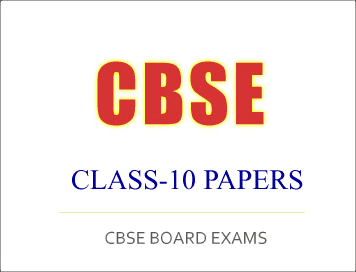
CBSE Class-10 Question Papers for IOP/Comptt Examination 2017
All India Scheme, (Home Science)
CBSE Class-10 Question Papers for IOP/Cmptt Examination : Home Science
SUMMATIVE ASSESSMENT - II
HOME SCIENCE
Time allowed : 3 hours
Maximum Marks : 80
1. A Ten year old Razia does not like to eat pulses. Which food should she choose from the
following instead of this ?
(i) Raisins
(ii) Groundnuts
(iii) Carrot
(iv) Orange
2. Fruits and vegetables are good source of which nutrient ?
(i) Vitamin
(ii) Iodine
(iii) Protein
(iv) Fats
3. What can Seema choose to increase the real income of her family from the following options ?
(i) Do her work herself
(ii) Buy a lottery
(iii) Put money in bank
(iv) Give her house on rent
4. What is the main reason for starching clothes ? For
(i) adding stiffness
(ii) adding brightness
(iii) keeping clothes clean
(iv) ease in ironing clothes
5.Fifteen year old Nisha thinks everyone is watching the tiny hole in her Kameez. What
is this experience called ?
(i) Idealism
(ii) Personal fable
(iii) Imaginary audience
(iv) Abstract thinking
6. Explain the meaning of RDA with the help of two examples.
7. State any two ways by which public libraries get misused ? Also suggest two ways to prevent this misuse.
8. What four factors would you consider while making a time plan for a working woman ?
9. Write four ways students can reduce their unnecessary expenses.
10. In what four ways can a cloth merchant cheat his customers ?
11. Write the advantages of using blue and bleach in washing of clothes.
12. Name two social skills eight year old Sona must develop. Also state why ?
13. State six drawbacks if family meals are not planned.
14. Write six advantages of using detergents.
15. Make your 12 years old twin brother and sister aware of any three physical changes which will occur in each of them in the next few years.
16.Plan a balanced meal for dinner for a family.
17.What four principles would you consider while planning meals ? Explain them with the help of examples.
18. Write four reasons of frustration fatigue. Also suggest four ways of coping with this fatigue.
19. Explain eight factors which increase the expenses of a family, with the help of examples.
20. Which standard mark would you look on a bottle of drinking water ? List any two indications by which you would know that this mark is not fake ? Also write any four functions of this mark.
21. What eight points of information will you write while making a label for an apple jam ?
22. What eight precautions should be taken while storing cotton clothes for a long period ?
23. Suggest four ways each your family can help meet the social and emotional needs of your grandfather.
24. Write ten factors which influence the meal planning of a family. Explain with the help of examples.
25. Your sister gets very tired while washing her clothes. Suggest to her ten different ways she can simplify her work and save her energy.
26.‘Price variation’ and ‘Adulteration’ are two major problems faced by consumers. Write five examples of each.
27.Your sister dropped some curry stains on her white cotton shirt. Tell her how to remove these. To prevent damaging the fabric, what eight precautions should she take while removing these stains ?
Courtesy: CBSE